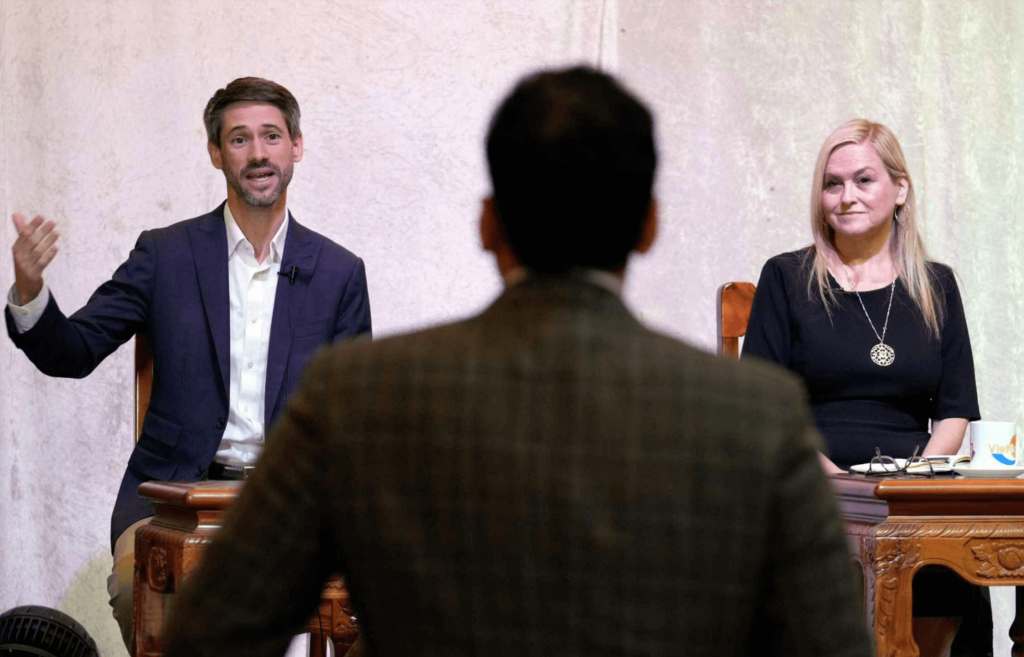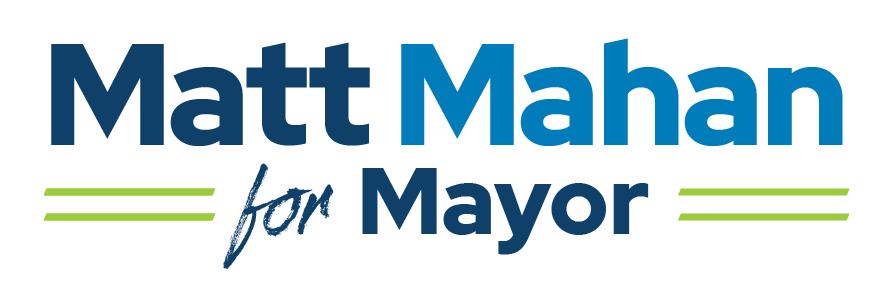
A big-money mayor’s race is shaping up to be a fight for the soul of Silicon Valley

By Shwanika Narayan, San Francisco Chronicle
Buddha statues towered behind a makeshift stage at a Vietnamese temple in San Jose. Mayoral candidates Cindy Chavez and Matt Mahan faced the camera, ready for their debate to be transmitted by Diya TV, an Indian American broadcast station, to its South Asian diaspora audience across the U.S.
No voting bloc is being overlooked in what is shaping up to be a big-money, high-stakes and sometimes bitter contest to run the 10th largest city in the nation and one of the most diverse cities in the country. Whoever wins the mayor’s race in the Nov. 8 general election will be tasked with steering a city with a $5 billion budget and a growing affordability crisis.
The race also has personal implications for the candidates involved.
Chavez, 58, is a veteran South Bay politician who is on the Santa Clara County Board of Supervisors, and would make history as the first Latina mayor if elected. Mahan, 39, a freshman San Jose City Council member, is leading with his record as a successful tech startup co-founder in promising a “common sense revolution.”
“My opponent is essentially the architect of the status quo in San Jose,” Mahan, a former public school teacher 21 months into his first political office, told The Chronicle via email. “We don’t need to double down on these failed policies. We need to change them.”
“Experience matters,” said Chavez, first elected to local office in 1998. “It takes a multipronged approach to work with people from different sectors, and to do that well. My opponent just doesn’t understand any of that.”
Both candidates have listed housing, homelessness and police staffing as top priorities in a city with the second-highest rents in the nation, a pandemic increase in homelessness and relatively flat crime rates.
While they agree on the challenges, they differ considerably on how to meet them — with those differences spilling over into proxy attack websites.
Those tensions weren’t easily spotted during the early moments of the Diya TV-hosted forum, as both candidates engaged in small talk while they waited for technical difficulties to subside.
The eventual victor will have to show results fast: Measure B, passed in June, aligns all future San Jose mayoral races with national presidential elections, meaning either Chavez or Mahan will be up for re-election in 2024.
The candidates and the issues
Born in New Mexico and raised in the East Bay, Chavez attended Moreau Catholic High School in Hayward and graduated from San Jose State University in 1987. After spending the next decade as a community organizer, Chavez served two terms on the San Jose City Council and ran unsuccessfully for mayor in 2006.
She spent the next six years engaging politicians rather than being one, as the executive officer of the South Bay AFL-CIO Labor Council and executive director of Working Partnerships USA, a nonprofit. She returned to political life in 2012, when she won a special election to the Santa Clara County Board of Supervisors, representing a district that encompasses central, east and south San Jose.
In her two terms on the board, Chavez pursued partnerships with school districts and community colleges to build scarce affordable housing on their land, worked to speed up testing of rape kits and expand services for domestic violence survivors, and spearheaded 2016’s Measure A, the $950 million housing bond that’s estimated to build 4,800 affordable units in the county by 2026.
“Permanent housing is the best solution to homelessness,” Chavez said in an interview. “We have to keep building and we have to keep housing people. Families are struggling with the rising cost of living.”
Mahan grew up low-income in Watsonville and earned a scholarship to the Bellarmine College Preparatory high school in San Jose before attending Harvard University. He was chief executive of Causes, an early Facebook application that lets nonprofits raise funds, and in 2014 co-founded Brigade, a voting advocacy platform acquired in 2019 by Countable, a nonpartisan political app, and Pinterest.
Mahan easily won election to the open District 10 council seat during the March 2020 primary, against consultant services executive Helen Wang, who was accused of padding her endorsements, and Bay Area Women’s March founder Jenny Higgins Bradanini, whose campaign was derailed by a fatal car accident she caused while on prescription tranquilizers.
Representing a district that includes wealthy neighborhoods Almaden Valley, Blossom Valley and Vista Park, Mahan said he has sometimes faced community opposition for his willingness to support different kinds of housing in his district, including a $51 million project for more than 200 transitional units and a safe parking site for people who live in their RVs.
Mahan has also pushed for new housing to be concentrated in approximately 55 commercial corridors that don’t currently allow residential zoning.
“We are going to build more housing where it makes sense, not where it will make our traffic problems worse,” Mahan wrote in an email. “The city spent more than a decade working on an ‘Urban Villages’ plan that does exactly that — focus new housing downtown, near existing jobs and well-served transit.”
But both Mahan and Chavez are against the idea of creating more housing through a city proposal to end single-family zoning, potentially setting up a conflict between the next mayor and the City Council.
In a city where a one-bedroom apartment averages around $2,700 a month and home prices hover around $1.4 million despite a recent slump in housing values, according to Zillow, San Jose remains far behind its housing goals. Since 2018, the city has accommodated 3,348 new housing units, 506 of which are affordable, according to city records — far short of the city’s plan to build 25,000 units,10,000 of them affordable, by 2023.
The housing pinch runs parallel to the homelessness crisis.
Homelessness increased by 11% in San Jose, to 6,739 people, from 2019 to 2022, according to the latest one-night survey. The largest increases occurred in the percentage of sheltered homeless people (74%), families (37%) and chronically homeless individuals (21%). While the percentage of unsheltered homeless people fell 2%, they still represent the largest proportion of San Jose’s homeless community, with 5,031 of the people experiencing homelessness doing so without shelter.
Mahan is calling for the mass production of tiny homes on county-owned property, such as the county fairgrounds, and for unhoused people to be obligated to use them. He’s also proposed paying homeless people to clean city streets and says he wants more programs and facilities that deal with mental illness and drug addiction in the homeless community.
Chavez is against the idea of using a single site like the fairgrounds to concentrate the unhoused population, and instead favors scattering smaller shelters in the city — run by nonprofits, supported by the county and providing “community benefit funds” to the neighborhoods that agree to host them.
The money and the tactics
As of Sept. 24, Mahan holds the head-to-head fundraising advantage, having raised nearly $2 million to Chavez’s almost $1.6 million. Together, the election rivals have poured more than $3 million into the race. But independent expenditures tell a different story, with $3.1 million favoring Chavez and $772,525 supporting Mahan, according to a San Jose Mercury News analysis.
Mahan has the support of departing Mayor Sam Liccardo, who formed the Common Good Silicon Valley political action committee in October 2021. The PAC is financially backed by Jay Paul, a billionaire developer with offices in San Francisco and other business and real estate interests. The Mercury News endorsed Mahan before the June primaries.
Chavez counts powerful endorsements from local, state and federal politicians, and financial backing from groups such as the NFL’s San Francisco 49ers, the United Food and Commercial Workers Independent Expenditure PAC, and the San Jose Police Officers’ Association, among others.
Santa Clara County District Attorney Jeff Rosen, who won a fourth term in June, said Chavez will unite the community and law enforcement.
“Cindy and I have worked together to ensure that every single rape kit is tested and tested faster than any other county in the country,” Rosen said in an email. “We have worked together to combat the fentanyl crisis and are currently addressing gun violence through the formation of a County Gun Task Force.”
The race has had its ugly moments. The United Food and Commercial Workers union, which endorsed Chavez, runs an anti-Mahan website called mealymouthmahan.com.
In an email to her supporters over the summer, Chavez’s campaign sent out a note suggesting Mahan has wavered in his support on abortion rights when he didn’t take a stance on the issue as the chief executive of Brigade.
Mahan told The Chronicle that it was his company, and not him, that didn’t take a stand. He said he has been “100 percent pro-choice and always have been” and that his opponent is running a “deeply cynical campaign attempting to imply otherwise.”
Ann Ravel, a former commissioner at the Federal Election Commission under the Obama administration, said falsehoods are one of the biggest threats to democracy and the email campaign from Chavez’s team was shameful.
“People do not know enough about candidates and therefore they can make decisions based on falsehoods,” said Ravel, a Los Gatos resident who now teaches law at UC Berkeley. Ravel said she met Mahan when he “volunteer-interned” for her while considering a law career.
Chavez doubled down on her campaign strategy, arguing that Mahan made a decision as a business executive that “put women at risk of losing their rights and necessary access to health.”
Mahan’s supporters have created an anti-Chavez website using her name (cindychavez.org) as the URL, to perpetuate claims of fiscal irresponsibility during her time in office. It was created by the Silicon Valley Biz PAC, a pro-business group that has endorsed Mahan.
The tactics elicited an editorial from the Mercury News calling for an end to the “unethical behavior in the San Jose mayoral race.”
Depending on whom you ask, both candidates are leading the race. Chavez came out ahead in the June primary, winning 39% of the vote compared with Mahan’s 32% out of a field of seven candidates. Two polls showing Mahan in the lead were paid for by PACs supporting him. A poll showing Chavez in the lead was paid for by a PAC supporting her.
One thing both candidates agree on is a need to hire more police officers, though they differ on how to go about doing it.
At the debate at the Buddhist temple, Chavez said she’d hire 45 police officers a year. Mahan said the debt the city has accrued through providing generous retirement benefits is a limiting factor and didn’t say how many officers he’d hire.
The San Jose Police Department employs 1,157 full-time sworn officers, 201 fewer than in 2000 for a city with 1 million residents, according to its website. In contrast, San Francisco employs 2,023 sworn police officers for a city with less than a million residents.
While crime rates in San Jose saw a 4% decline in 2021 compared with the year before, violent crimes such as rape, robbery and aggravated assault were up by 10%. Over a 10-year period, total crime rates were down by almost 5% and violent crimes were down by 26%, according to SJPD crime data.
Mahan has been holding three to five neighborhood meet-and-greets a week to chat with voters.
At Chavez’s campaign office, around 50 volunteers gathered early on an October Saturday morning for a campaign rally before knocking on doors.

